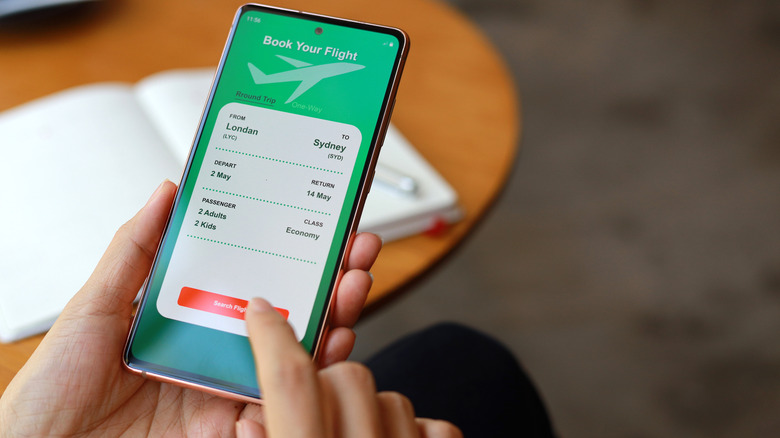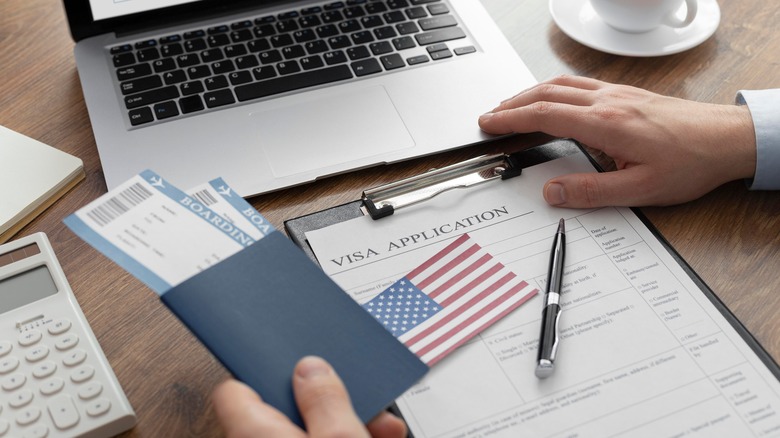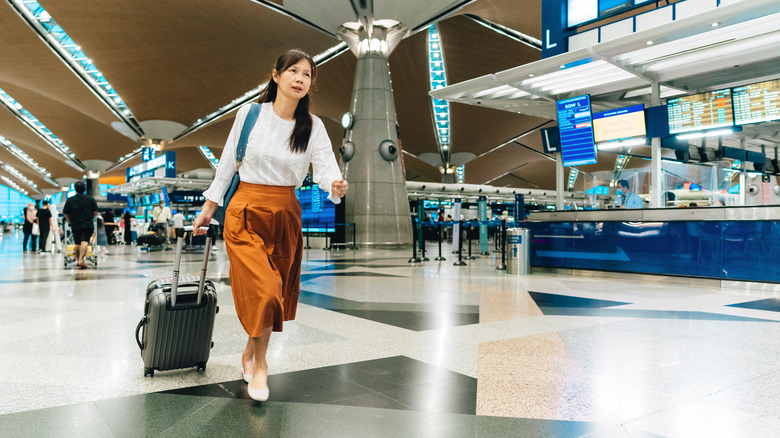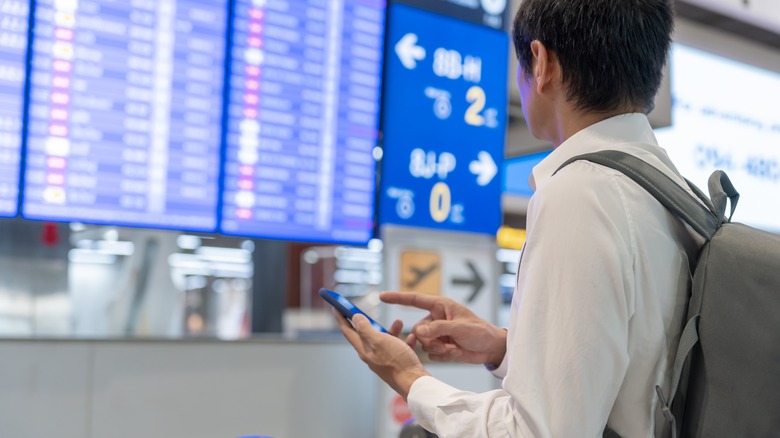Flight Booking Myths To Know Before Planning Your Next Trip
As we all know by now, plane ticket prices are fickle. The cost of tickets to fly anywhere, domestic or international, have become so unpredictable that it can be challenging to pinpoint the exact time to book to get the best bang for your buck. Do you book now to secure a specific price point, or do you bide your time with the hopes of coming across a more wallet-friendly option? No one can really give clarity except the airlines themselves, but they won't exactly be agreeable to spilling their pricing secrets to travelers, will they?
Because of the tumultuous nature of airfare, there are many supposed money-saving "hacks" that are bandied about online. Even self-proclaimed travel experts endorse them, so much so that certain tips and tricks have been accepted as a universal truth. To be fair, some of them sound sensible and harmless enough that they seem worth giving a shot, like clearing browsing cookies before searching for a flight or booking on a specific day. But truth be told, even though they sound like solid advice, they're often not as effective as they appear.
It's easy to fall for one of these myths if you're eager to save cash, but strictly sticking to them may just burn a hole in your pocket if you're not careful. So, let's unpack these myths and dig deep as to why they're not as helpful as they claim to be.
Going incognito in your browser won't do anything
There's a widespread belief that if you search for flights, airlines will take note and subsequently jack up prices, so many offer the advice to go incognito, use a VPN, or clear your browser's cookies before booking a flight to start fresh. But the truth paints a different picture. While it's true that airlines and booking sites may track you, it's only to provide you with more accurate results, not to manipulate airfare.
James Byers, group product manager for Google Flights, explained to The Washington Post that the factors influencing ticket prices don't include your browsing activity. In addition to airline dynamic pricing, booking sites collect tons of data from various sources that change quite literally in the blink of an eye, leading to the constant flux of prices. "For example, there could be billions of potential ticket combinations for trips between Los Angeles and London when you factor in variables like connecting flights and the different prices available from different booking sites," he said. This explains why prices change each time you hit search.
Plane ticket prices shift all the time, so if you're looking to book a flight, you have to search prices often. When you come across a price that is agreeable to your checking account, perhaps take it as a sign to book. There's no way to tell when it will return to the same price again — if at all.
There's no 'best' day to book your flight
You've likely heard about the "trick" that the best day to book a flight is a Tuesday, as the lowest fares are usually scored that day. But this couldn't be further than the truth. The best day to book a flight isn't Tuesday, nor is it Wednesday, or any other day. There's no "best" day to book any flight to any destination because, again, airlines employ dynamic pricing. Prices are determined by an algorithm that takes into account demand, time of year, fuel costs, and more.
"This was good advice 20 years ago, but it's not very good advice today," Scott Keyes, founder of flight alert service Scott's Cheap Flights, shared with The Washington Post, noting that the myth started during an era when airlines followed a fixed schedule for selling tickets. "If you were one of the first people to book your flight after they loaded the new fares, you might be able to get one of those very limited number of cheap fares available," he added.
Instead of thinking about the best day to book, shift your focus to the best day to fly instead. Phil Dengler, founder of TheVacationer.com, told CNN that flights tend to be cheaper on off-peak days. "I've found that it is generally cheaper to fly on Tuesdays, Wednesdays, and Saturdays," he said. "That is not a hard rule, but I have found it to be the case the majority of the time."
Booking too early will not always yield discounts
The early bird doesn't always get the worm, especially when it comes to booking flights. You'd think that you can score the best bargains by booking, say, more than half a year before your flight, but doing so only deprives you of the opportunity to take advantage of discounts and deals that may pop up in the weeks and months leading up to the flight. The advantage, though, is you get to pick from a wider pool of flight and seat options.
Planning ahead is always wise when you're putting together a trip, but if your priority is to save as much money as you can on airfare, the trick lies in finding the golden window, or the short period when flights tend to be the cheapest. A comprehensive CheapAir.com study refers to this as the "prime booking window," and it falls between 164 to 46 days before your flight, or roughly 5.5 to 1.5 months in advance. It's not an absolute guarantee that you'll get the cheapest tickets during this time, of course, but based on airline pricing trends, this timeframe is when you can get airfare that may best align with your budget.
You won't score savings with last-minute bookings, either
Conversely, booking flights at the last possible minute is also not the smartest idea. In the past, airlines lacked access to algorithms that could help them with their pricing strategies, so they offered last-minute discounts to passengers just to fill up an aircraft. But now airlines tend to overbook planes, leaving little room for eleventh-hour bargains.
Presently, the trend is: the closer the flight, the more expensive the airfare. "Airlines will tend to put flights onto their schedule and set a fare for that flight way out," Chuck Thackston, managing director of data science at Airlines Reporting Corporation, explained to The Points Guy. "They don't do a whole lot of changes or active management of that for quite a while, up until it gets a little bit closer to departure."
If you still choose to stall booking, but wish to get dibs on some deals, Scott Keyes recommends booking 21 days before the flight at the latest, as certain deals lapse after this period. "It's no longer available for purchase, and the new cheapest flight is actually going to be $100 to $200 more expensive," he said.
If you must book at the last minute, you can try using your points and miles to offset some of the extra spending. The viral TikTok last-minute airplane ticket hack that suggests you buy your ticket at the counter may also work, but note that not all airlines offer it.
Skiplagging is not the best way to save
Because airfare can sometimes be prohibitively expensive, travelers try to find ways to outsmart airlines. One increasingly popular tactic is skiplagging, also known as hidden-city ticketing or throwaway ticketing. The concept revolves around the idea that you stand to save money by booking a flight with a layover instead of direct, and then disembarking at the layover rather than the final destination. For instance, if you discover that a direct flight from Los Angeles to Dallas is too expensive, and later chance upon a cheaper Los Angeles to Chicago flight with a quick stopover at Dallas, then you may be inclined to book the latter and simply ditch the final leg of the trip.
This purported cost-saving technique may indeed yield substantial savings in some cases, but it's not exactly ethical. It's currently not illegal, but it's frowned upon by many airlines. Major carriers like American Airlines, Delta, Southwest, and United don't condone the practice, and will most likely impose penalties, like banning you from flying with them, suspending your frequent flyer account, billing you later on, or worse, pursuing legal action. "If you've done this repeatedly, [the airline] is going to say you owe us money," Henry Harteveldt, a travel industry analyst, told NPR. "They may be willing to settle for a certain number of cents on the dollar. Maybe they want to collect all of it. But airlines can and will take steps to protect themselves."





